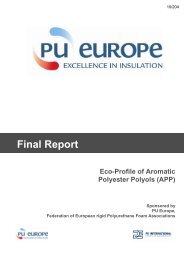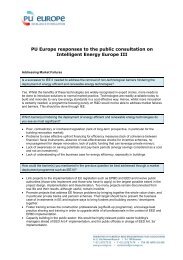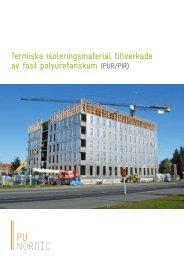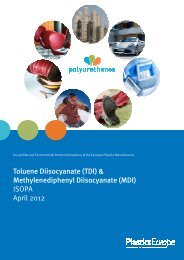Multiple benefits of renovation in buildings - PU Europe
Multiple benefits of renovation in buildings - PU Europe
Multiple benefits of renovation in buildings - PU Europe
Create successful ePaper yourself
Turn your PDF publications into a flip-book with our unique Google optimized e-Paper software.
<strong>Multiple</strong> <strong>benefits</strong> <strong>of</strong> <strong>in</strong>vest<strong>in</strong>g <strong>in</strong> energy<br />
efficient <strong>renovation</strong> <strong>of</strong> build<strong>in</strong>gs<br />
the scenario). This loss <strong>of</strong> tax revenue is not a loss to society as a whole, s<strong>in</strong>ce it is a transfer<br />
from governments to consumers. However, it still counts aga<strong>in</strong>st the <strong>benefits</strong> to public<br />
budgets which we f<strong>in</strong>d elsewhere <strong>in</strong> this report.<br />
Figure 9 Reduced tax revenue from energy taxes<br />
€ bn<br />
16<br />
2012-2020 2020-2030<br />
14<br />
12<br />
10<br />
8<br />
6<br />
4<br />
2<br />
5.2<br />
7.2<br />
9.7<br />
13.8<br />
0<br />
Low EE scenario High EE scenario Low EE scenario High EE scenario<br />
Public revenue loss<br />
Note:<br />
The calculation is based on an average electricity tax <strong>in</strong> EU, and the excise duties on natural gas and<br />
coal for heat<strong>in</strong>g use <strong>in</strong> bus<strong>in</strong>ess and non-bus<strong>in</strong>ess for Germany. While the Member States’ electricity<br />
taxation and excise duties on heat varies greatly, our calculations can be used as an approximate average<br />
for EU as a whole.<br />
Source: Copenhagen Economics based on DG Energy (2010), DG TAXUD (2012)<br />
Reduced outlay on government subsidies<br />
In several EU Member States, government subsidies are be<strong>in</strong>g allocated both to consumption<br />
<strong>of</strong> energy through e.g. fuel tax reductions/exemptions, and to deployment <strong>of</strong> renewable<br />
energy technologies that cannot yet compete without government subsidies. While<br />
some Member States subsidise production <strong>of</strong> energy, the majority <strong>of</strong> these subsidies are<br />
related to the w<strong>in</strong>d<strong>in</strong>g down <strong>of</strong> coal fired power plants. 17 Such subsidies are not related to<br />
the level <strong>of</strong> energy consumption, and are therefore not expected to be reduced by reduced<br />
energy consumption from <strong>in</strong>creased energy efficient <strong>renovation</strong> <strong>of</strong> build<strong>in</strong>gs.<br />
We f<strong>in</strong>d that the outlay on energy consumption subsidies <strong>in</strong> n<strong>in</strong>e large EU countries correspond<br />
to about €11.7 billion annually. 18 By reduc<strong>in</strong>g energy consumption through energy<br />
efficient <strong>renovation</strong> <strong>of</strong> build<strong>in</strong>gs accord<strong>in</strong>g to the potentials identified <strong>in</strong> our two scenarios,<br />
we f<strong>in</strong>d that these governments can reduce outlays on subsidies by €0.7 – 1.1 billion<br />
annually <strong>in</strong> 2020 (low and high scenario), cf. Figure 10.<br />
Additionally, by reduc<strong>in</strong>g energy consumption, the target <strong>of</strong> 20 per cent renewable energy<br />
by 2020 can be achieved at reduced costs for governments. In particular, EU governments<br />
can reduce outlays on subsidies to renewable energy deployment annually by €7.1 billion<br />
17 See OECD (2011c)<br />
18 Estimate is based on data from OECD (2011c).<br />
17
















